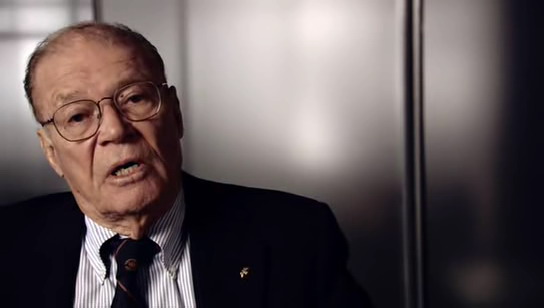“Bush stopped short of accusing Franklin D. Roosevelt and Winston Churchill of outright perfidy, but his words recalled those of hardcore FDR- and Truman-haters circa 1945…Bush’s cavalier invocations of history for political purposes are not surprising. But for an American president to dredge up ugly old canards about Yalta stretches the boundaries of decency and should draw reprimands (and not only from Arthur M. Schlesinger Jr.)” Slate‘s David Greenberg outlines Dubya’s recent mischaracterization of the Yalta conference. Well, Dubya doesn’t even seem to understand diplomacy now, so why would he understand it then?
Tag: Cold War
Requiem for a Diplomat.
R.I.P. George Kennan 1904-2005. The nation has lost one of its senior diplomatic statesmen, at a moment when men and women of his wisdom, judgment, and foreign policy experience are needed in the public arena more than ever. He will be missed.
Foggy Winter.

If you can stand being bombarded by endless slo-mo shots of dropping ordnance set to a Phillip Glass pulse, The Fog of War, the new Errol Morris documentary about and extended interview with former Secretary of Defense Robert McNamara, makes for an interesting evening out. Despite the heavy saturation on screen, there are no real historical bombshells dropped here — The movie doesn’t aim to muckrake a la The Trials of Henry Kissinger, and the picture you get of Vietnam-era McNamara is the same one you’d find in a book like Robert Schulzinger’s A Time for War: Publicly optimistic, McNamara seems deeply cognizant from early on that Vietnam will be a quagmire, but he — like LBJ and almost all of the foreign policy establishment — are too blinded by the fear of falling dominoes to consider withdrawal as a viable option. (McNamara does add fuel to the fire here that Kennedy wanted a full withdrawal by 1965. I guess if anyone would know, he would, but the books I’ve read don’t really bear this out.)
Nor do we ever seem to get under McNamara’s skin here — he remains intelligent and composed throughout, deflecting the tougher questions about Vietnam with a practiced ease. Still, McNamara, a surprisingly spry 86, does offer us some intriguing (and occasionally self-serving) reminiscences here about his experiences in the corridors of power, from his assessment that the Cuban Missile Crisis was defused mainly by simple, dumb luck to his thoughts on the morality of civilian fire-bombing, which he efficiency-maximized for Curtis LeMay during WWII.
As a documentary, The Fog of War sometimes gets clouded by its own cinematic devices — to take just one example, there’s a shot of dominoes across a map of Asia that is striking at first but fast becomes overused. And the continual Phillip Glass cascading over falling bombs and rushing people had me thinking of Koyaanisqatsi outtakes a lot of the time. In sum, the film works best when it’s simply an engaging monologue by an intelligent, evasive, and often frustrating Cold Warrior as he muses over a life perhaps not-so-well lived.
Politics by other means.
Well, due to various other projects — end of term grading, freelance history textbook work, attending multiple job talks for a pending Columbia hire — my online note-taking has fallen even farther behind my orals reading lately. But, the spirit marches on. So, without further ado:
| John Lewis Gaddis, Strategies of Containment: A Critical Appraisal of Postwar American National Security Policy. David Kennedy, Over Here: The First World War and American Society. |
Dust, Discrimination, and Domestic Containment.
Some thanksgiving orals reading, for you and yours…read with lavish amounts of stuffing and cranberry sauce.
| Elaine Tyler May, Homeward Bound: American Families in the Cold War Era. C. Vann Woodward, The Strange Career of Jim Crow. Donald Worster, Dust Bowl: The Southern Plains in the 1930s. |
